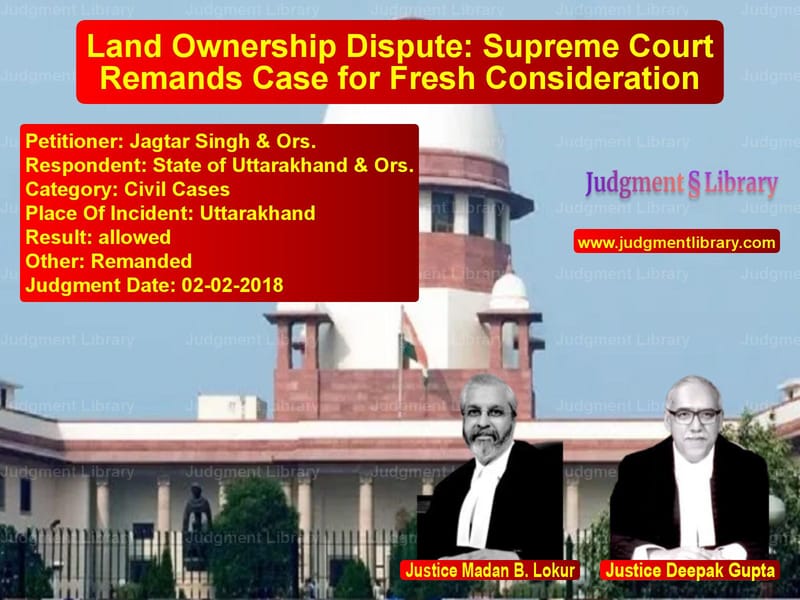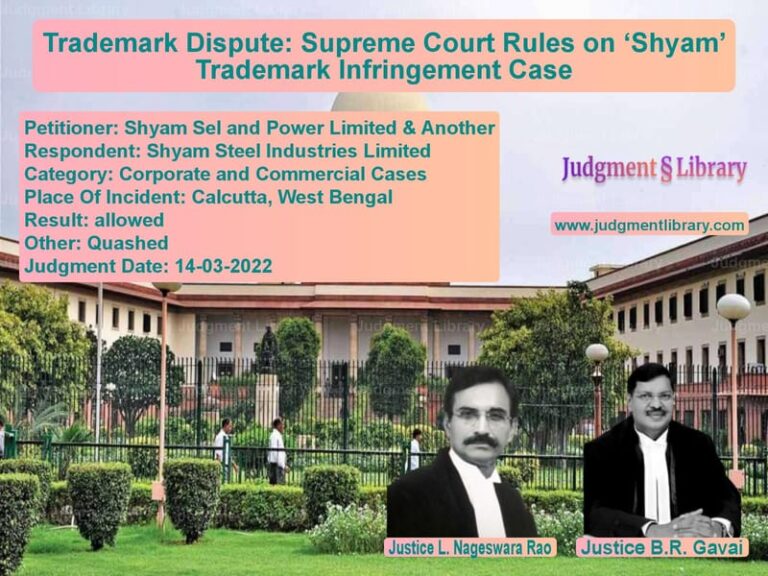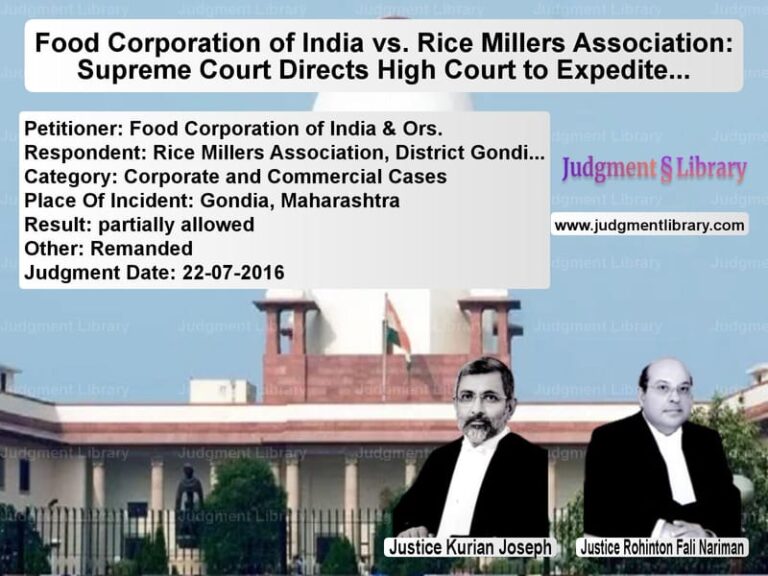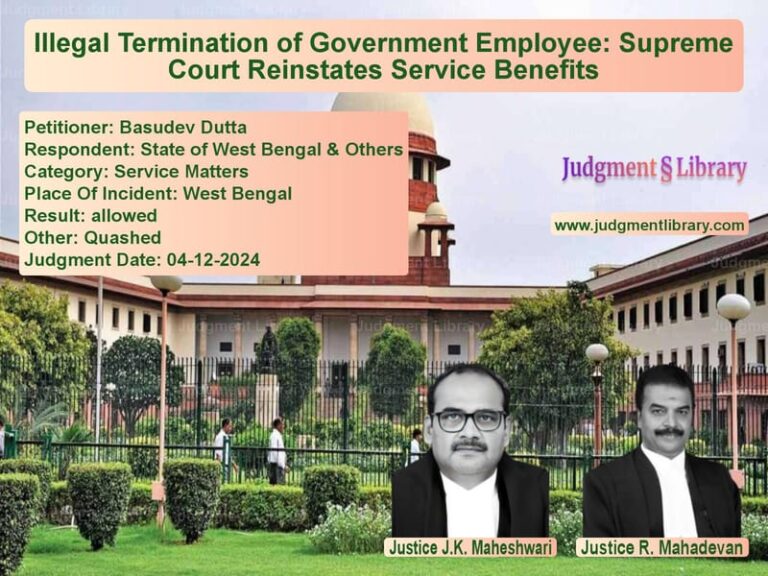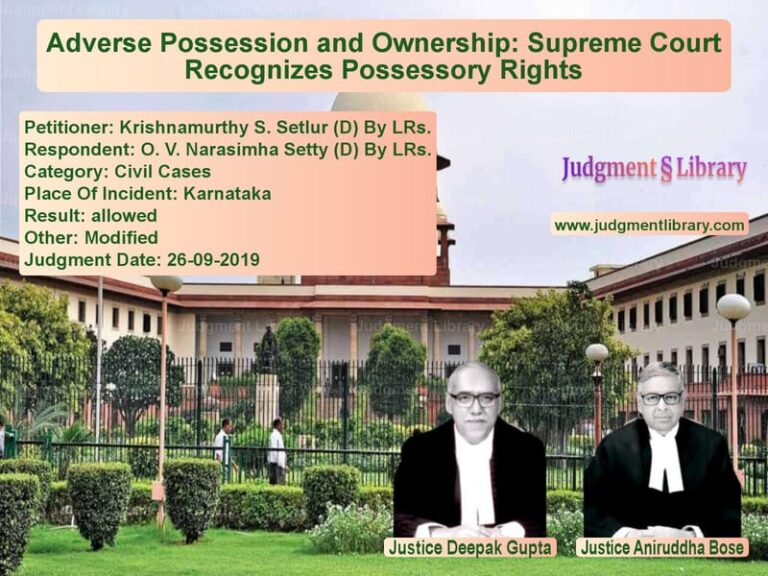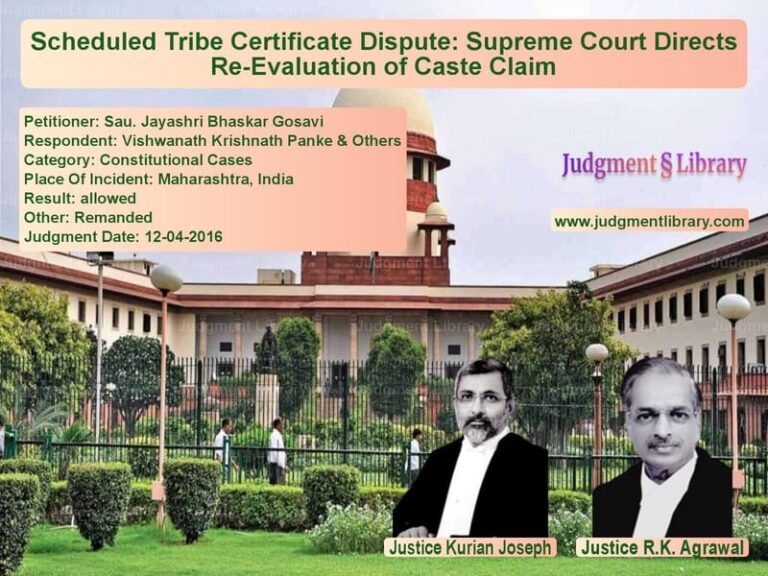Land Ownership Dispute: Supreme Court Remands Case for Fresh Consideration
The Supreme Court of India, in its judgment in Jagtar Singh & Ors. vs. State of Uttarakhand & Ors., addressed a significant issue related to land ownership and the legality of revenue entries made by a Supervisor Qanoongo without proper notice. The case revolved around the dispute over the rightful possession of agricultural land and the procedural lapses in revenue record corrections. The ruling emphasized the importance of adhering to due process in revenue matters and ensuring fair opportunities for all parties involved.
Background of the Case
The case pertained to a land dispute between the appellants, Jagtar Singh and others, and the legal heirs of one Teja Singh. The dispute arose when the name of appellant Harbhajan Kaur (since deceased) was entered into the revenue records in Varg-4 by the Supervisor Qanoongo. However, Teja Singh’s sons, Jagir Singh and Karnail Singh, objected to this entry, claiming that they were the rightful successors in possession of the land after their father’s death.
The legal battle over this entry moved through multiple levels:
- The Settlement Officer reversed the entry in favor of Jagir Singh and Karnail Singh.
- The Deputy Director of Consolidation dismissed the revision petition filed against the Settlement Officer’s decision.
- The appellants then approached the High Court of Uttarakhand, which dismissed their writ petition and upheld the findings of the Settlement Officer and the Deputy Director of Consolidation.
- Finally, the matter reached the Supreme Court of India through an appeal.
Key Legal Issues Considered
- Whether the Supervisor Qanoongo had the legal authority to make changes in revenue records without prior notice.
- Whether the findings of the Settlement Officer and the Deputy Director of Consolidation were legally valid.
- Whether the High Court’s direction to delete the names of both parties from the revenue records was legally sustainable.
Arguments Presented
Petitioner’s (Jagtar Singh & Ors.) Arguments
- The Supervisor Qanoongo lawfully recorded the name of Harbhajan Kaur, who was in possession of the land.
- The legal heirs of Teja Singh had failed to challenge the entry at the time it was made.
- The Settlement Officer and the Deputy Director of Consolidation erred in setting aside the entry without examining the actual possession of the land.
- The High Court’s decision to remove both parties’ names from the revenue records was incorrect and unjustified.
Respondent’s (State of Uttarakhand & Ors.) Arguments
- The Supervisor Qanoongo made the entry in the revenue records without following due process, including public notice and notifying legal heirs.
- The High Court correctly found that the entry was illegal, as it did not comply with the provisions of Para 423 of the Land Records Manual.
- The High Court’s decision to delete all entries from the records was aimed at ensuring a fair resolution of the dispute.
Supreme Court’s Observations
The Supreme Court carefully analyzed the procedural lapses and the decisions of the lower authorities. The Court observed:
“The Supervisor Qanoongo could not have made entries in favor of the appellants without giving public notice and without giving notice to the legal heirs of Teja Singh.”
However, the Court disagreed with the High Court’s approach of deleting the names of both parties from the revenue records, stating:
“The High Court erred in directing that the names of both the parties should be removed. This could not have been done.”
Final Judgment and Directions
- The Supreme Court set aside the High Court’s direction to delete both parties’ names from the revenue records.
- The case was remanded to the Supervisor Qanoongo to determine the rightful possession of the land.
- The Supervisor Qanoongo was directed to conduct a fresh inquiry, after hearing both parties, and make appropriate entries in the revenue records.
- Both parties were given the right to present their claims before the Supervisor Qanoongo.
Implications of the Judgment
This ruling has significant implications for land and revenue disputes. The Supreme Court reinforced that:
- Revenue authorities must follow due process: Any changes in land records must be made only after proper notice and inquiry.
- Judicial decisions must ensure fairness: Courts must not pass sweeping orders that negatively impact both parties without a proper factual determination.
- Possession matters in land disputes: The ruling highlights that the actual possession of land must be determined before altering revenue records.
- Landowners must remain vigilant: Legal heirs and claimants should actively monitor revenue records to prevent unauthorized changes.
Conclusion
The Supreme Court’s judgment in this case sets a precedent for land revenue disputes. It underscores the importance of procedural fairness and prevents arbitrary alterations in land records. By remanding the case for fresh consideration, the Court has ensured that possession rights are determined based on legal principles and actual possession, rather than administrative errors or omissions. This ruling serves as a critical reminder for landowners and revenue authorities to follow due process in all land-related matters.
Petitioner Name: Jagtar Singh & Ors.Respondent Name: State of Uttarakhand & Ors.Judgment By: Justice Madan B. Lokur, Justice Deepak GuptaJudgment Date: 02-02-2018
Don’t miss out on the full details! Download the complete judgment in PDF format below and gain valuable insights instantly!
Download Judgment: Jagtar Singh & Ors. vs State of Uttarakhand Supreme Court of India Judgment Dated 02-02-2018.pdf
Direct Downlaod Judgment: Direct downlaod this Judgment
See all petitions in Property Disputes
See all petitions in Landlord-Tenant Disputes
See all petitions in Succession and Wills
See all petitions in Judgment by Madan B. Lokur
See all petitions in Judgment by Deepak Gupta
See all petitions in allowed
See all petitions in Remanded
See all petitions in supreme court of India judgments February 2018
See all petitions in 2018 judgments
See all posts in Civil Cases Category
See all allowed petitions in Civil Cases Category
See all Dismissed petitions in Civil Cases Category
See all partially allowed petitions in Civil Cases Category

